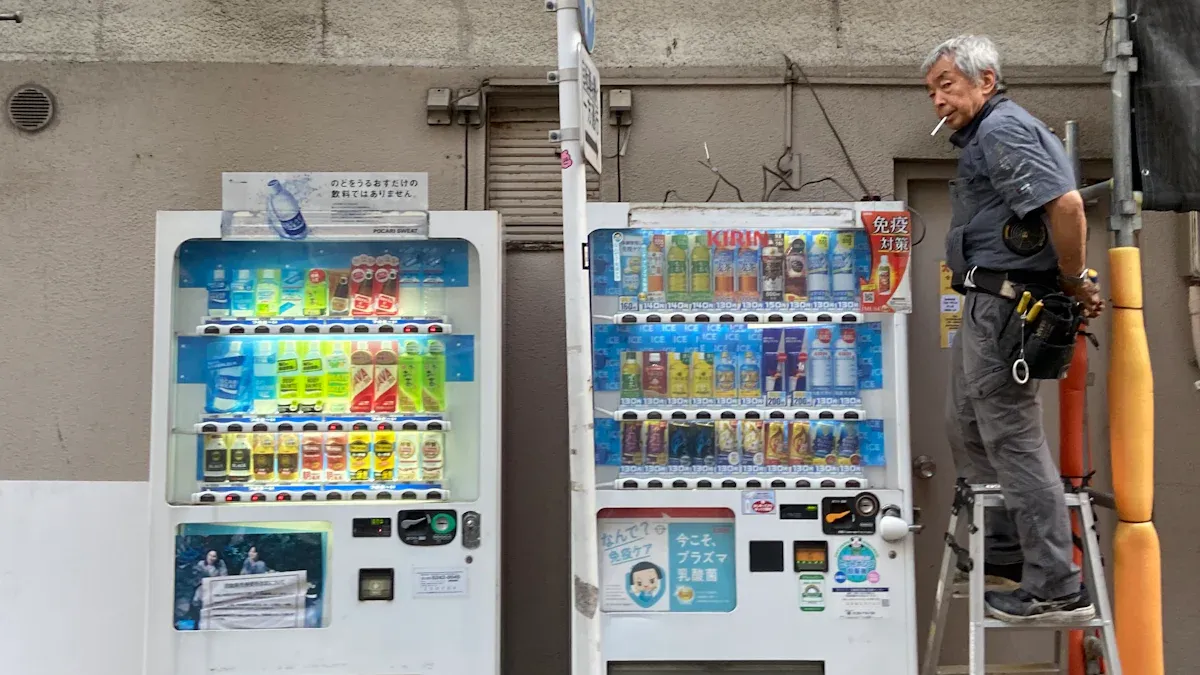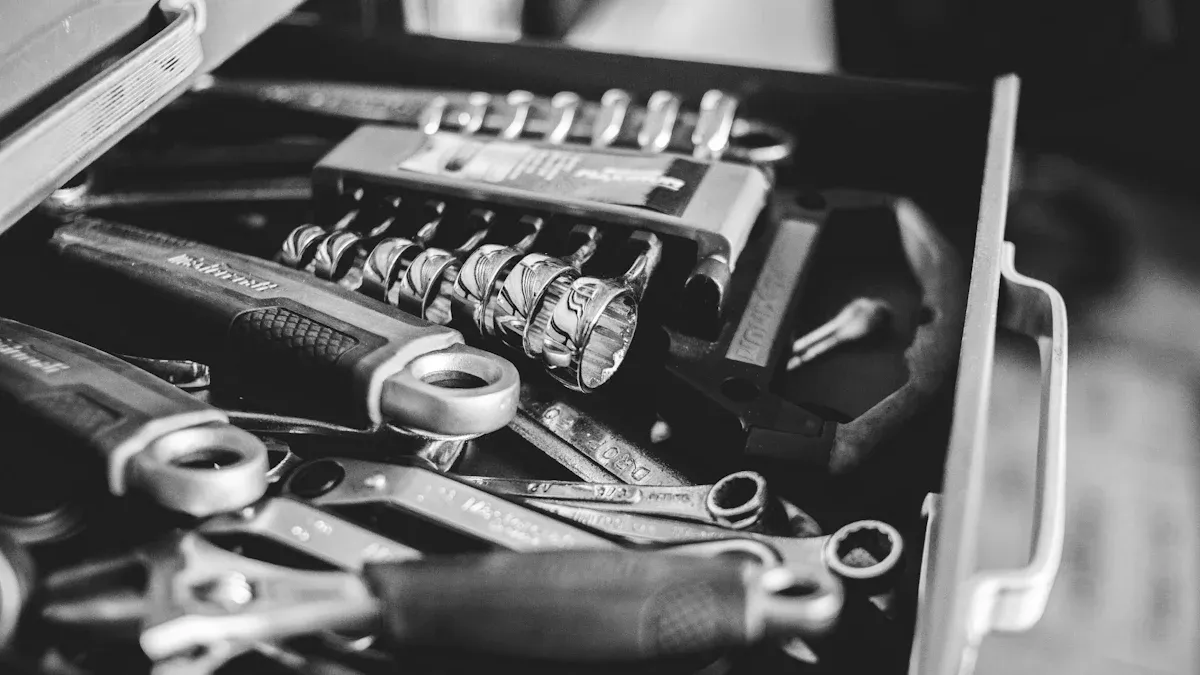Essential Maintenance Tips for Vending Machine Locks and Doors

Vending machine locks and doors play a vital role in protecting your merchandise and cash. High-quality T-handle locks resist tampering, drilling, and forced entry, ensuring the machine stays secure. Regular maintenance keeps these components functional and prevents costly repairs. By following maintenance tips, you can enhance security and extend the lifespan of your vending machines.
Key Takeaways
Clean and oil vending machine locks often to stop sticking.
Check doors and locks every month for damage, rust, or shifting.
Use strong locks and keys to avoid breaking and improve safety.
Common Issues with Vending Machine Locks and Doors
Jammed or Stuck Locks
Locks often jam due to dirt buildup or worn-out internal mechanisms. You may notice difficulty turning the key or unlocking the machine. Regular cleaning and lubrication can prevent this issue. Vending machines with T-handle locks are particularly prone to jamming, especially in high-traffic areas.
Worn-Out or Damaged Keys
Keys wear out over time, especially if used frequently or improperly. Damaged keys can break inside the lock, leaving you unable to access the machine. Using high-quality keys and storing spares securely can minimize disruptions.
Misaligned or Warped Doors
Doors can become misaligned due to frequent use or accidental impact. Warped doors may not close properly, compromising the machine's security. Inspecting hinges and adjusting alignment regularly ensures smooth operation.
Rust or Corrosion on Locks and Hinges
Exposure to moisture or humidity often leads to rust on locks and hinges. Corrosion weakens these components, making them more susceptible to tampering. Anti-rust coatings and regular inspections help maintain their integrity.
Security Vulnerabilities Due to Wear and Tear
Vending machines are frequent targets for vandalism and theft. Worn-out locks and doors increase the risk of unauthorized access. Reinforced locks and surveillance cameras enhance security, while regular inspections help identify vulnerabilities early.
Tip: Regular maintenance tips, such as cleaning and inspecting locks and doors, can prevent these common issues and extend the lifespan of your vending machines.
Maintenance Tips for Vending Machine Locks

Regular Cleaning to Remove Dirt and Debris
Dust and debris can accumulate inside vending machine locks, causing them to stick or jam. You should clean the locks regularly using a soft cloth to remove dirt from the surface. For deeper cleaning, use a small brush to reach inside the keyhole. Outdoor machines require extra care. Applying a corrosion-resistant spray can protect locks from rust caused by humidity or rain.
Lubricating Locks with Lock-Safe Products
Locks need lubrication to function smoothly. Use a light lubricant specifically designed for locks to keep the internal mechanisms moving freely. Apply the lubricant sparingly to avoid attracting dirt. Focus on the keyhole and any moving parts. Periodic lubrication prevents wear and tear, ensuring the lock remains reliable over time.
Inspecting for Signs of Wear or Damage
Routine inspections help you identify issues before they become major problems. Create a checklist to track inspections and note irregularities. Look for loose components, frayed wiring, or signs of rust. Verify that the lock operates smoothly and securely. If you notice persistent issues, consider replacing the lock to maintain the machine’s security.
Using High-Quality Keys to Prevent Breakage
Low-quality keys can bend or break, leaving you unable to access the machine. Invest in durable, high-quality keys to reduce the risk of damage. Handle keys carefully to avoid unnecessary strain. Always test new keys to ensure they work properly with the lock.
Keeping Spare Keys Securely Stored
Spare keys are essential for emergencies. Store them in a secure location, such as a locked cabinet or safe. Label the keys clearly to avoid confusion. Having spare keys readily available minimizes downtime if the primary key is lost or damaged.
Tip: Following these maintenance tips ensures vending machine locks remain functional and secure, reducing the risk of costly repairs or disruptions.
Maintenance Tips for Vending Machine Doors

Checking Door Alignment and Adjusting Hinges
Misaligned doors can cause vending machines to close improperly, leaving them vulnerable to tampering. You should regularly check the alignment of the door by observing how it closes. If it doesn’t shut evenly, inspect the hinges for wear or damage. Adjust the hinges using a screwdriver or wrench to ensure the door fits snugly. Proper alignment not only enhances security but also prevents unnecessary strain on the lock.
Tightening Loose Screws or Bolts
Loose screws or bolts can weaken the structure of vending machine doors. Over time, vibrations and frequent use may cause these components to loosen. Inspect all screws and bolts during routine maintenance. Tighten them with the appropriate tools to keep the door secure. This simple step can prevent larger issues, such as misalignment or compromised security.
Cleaning Door Seals for Proper Closure
Dirty or damaged seals can prevent vending machine doors from closing tightly. Use a damp cloth to clean the seals and remove any debris. For stubborn grime, apply a mild cleaning solution. Inspect the seals for cracks or wear, and replace them if necessary. Clean seals ensure proper closure, which helps maintain the machine’s security and functionality.
Inspecting for Rust or Corrosion
Rust and corrosion can weaken the door and its components, making the machine more susceptible to tampering. Examine the door and hinges for signs of rust. If you find any, use a rust remover or sandpaper to clean the affected areas. Apply an anti-rust coating to protect the metal from further damage. Regular inspections and treatments can extend the lifespan of your vending machine doors.
Reinforcing Doors for Enhanced Security
Reinforcing vending machine doors adds an extra layer of protection against theft. Durable T-handle locks, made from hardened steel, resist corrosion and physical damage. Their tamper-resistant design makes unauthorized access difficult. These locks work well for both indoor and outdoor machines, ensuring consistent security. Reinforced doors, combined with regular maintenance tips, can significantly reduce security risks.
Tip: Regularly maintaining vending machine doors ensures they remain secure and functional, protecting your investment and reducing downtime.
Tools and Products to Aid Maintenance
Recommended Lubricants for Locks
Using the right lubricant ensures your vending machine locks operate smoothly. Choose a lock-safe lubricant, such as graphite powder or silicone-based sprays. These products reduce friction without attracting dirt. Avoid oil-based lubricants, as they can gum up over time. Apply the lubricant sparingly to the keyhole and moving parts for the best results.
Cleaning Solutions for Metal Components
Metal components like locks and hinges require regular cleaning to prevent rust and debris buildup. Use a mild cleaning solution designed for metal surfaces. A mixture of water and vinegar works well for removing grime. For stubborn stains, a soft-bristle brush can help. After cleaning, dry the components thoroughly to avoid moisture damage.
Tools for Adjusting Hinges and Screws
Keeping vending machine doors aligned requires the right tools. A basic toolkit with screwdrivers, wrenches, and pliers is essential. Use a screwdriver to tighten loose screws or adjust hinges. For more precise adjustments, a torque wrench can help. Having these tools on hand ensures quick fixes during routine maintenance.
Anti-Rust Coatings and Protectants
Rust weakens locks and doors, compromising security. Apply anti-rust coatings to protect metal surfaces. Products like WD-40 Specialist Corrosion Inhibitor or Rust-Oleum sprays are effective. These coatings form a protective layer, preventing moisture from causing damage. Regular application extends the lifespan of your vending machine components.
Security Upgrades for Advanced Vending Machines like Cloudpick's Unmanned Store
Advanced vending machines, such as Cloudpick's Unmanned Store, benefit from enhanced security measures. Consider upgrading to tamper-resistant locks or smart locking systems. Reinforced doors and anti-theft turnstiles provide additional protection. These upgrades, combined with regular maintenance tips, ensure your vending machine remains secure and functional.
Tip: Investing in the right tools and products simplifies maintenance and enhances the performance of your vending machines.
Signs It’s Time to Replace Locks or Doors
Persistent Lock Jamming or Sticking
If your vending machine locks frequently jam or stick, it may be time for a replacement. Regular cleaning and lubrication can only do so much. When locks continue to malfunction despite maintenance, their internal mechanisms may be worn out. Persistent jamming not only slows down operations but also increases the risk of complete lock failure. Replacing the lock ensures smooth functionality and prevents unexpected downtime.
Visible Damage or Cracks on Doors
Inspect your vending machine doors for visible damage, such as cracks, dents, or warping. These issues weaken the door's structure, making it easier for thieves to break in. Damaged doors also compromise the machine’s ability to close securely. If repairs no longer restore the door’s integrity, replacing it becomes the best option to maintain security.
Difficulty in Securing the Machine
When you struggle to lock or secure your vending machine, it signals a problem. Misaligned doors, worn-out locks, or damaged hinges often cause this issue. If adjustments and repairs fail to resolve the problem, replacing the faulty components is essential. A secure machine protects your inventory and reduces the risk of theft.
Excessive Rust or Corrosion
Rust and corrosion weaken locks and doors over time. If you notice extensive rust that cannot be removed or treated, replacement is necessary. Corroded components are more likely to break or fail, leaving your vending machine vulnerable. Upgrading to rust-resistant materials can prevent future issues.
Outdated Locks That Compromise Security
Older locks may lack the advanced security features found in modern designs. Outdated locks are easier to tamper with, putting your vending machine at risk. Upgrading to tamper-resistant or smart locks enhances security and ensures your machine stays protected against evolving threats.
Note: Replacing worn-out locks or doors improves security and functionality, safeguarding your vending machine investment.
Best Practices for Long-Term Care
Establishing a Regular Maintenance Schedule
Creating a maintenance schedule ensures your vending machines stay in top condition. Set specific intervals for cleaning, inspecting, and lubricating locks and doors. Weekly or monthly checks can help you catch minor issues before they escalate. Use a calendar or digital tool to track these tasks. Consistency in following your schedule will reduce the risk of unexpected breakdowns.
Training Staff on Proper Handling
Improper handling can damage vending machine locks and doors. Train your staff to use keys carefully and avoid forcing locks. Teach them how to open and close doors without applying excessive pressure. Provide clear instructions on basic maintenance tasks, such as cleaning seals or tightening screws. Well-trained staff can help extend the lifespan of your machines.
Documenting Maintenance and Repairs
Keep a record of all maintenance and repair activities. Note the date, type of service, and any parts replaced. This documentation helps you track the machine’s condition over time. It also provides valuable information if you need professional assistance. Organized records make it easier to identify recurring issues and plan for replacements.
Partnering with Professionals for Inspections
Professional inspections can uncover hidden problems that routine checks might miss. Schedule periodic inspections with experts who specialize in vending machines. They can assess the condition of locks, doors, and other components. Professionals also provide advice on upgrades or replacements to enhance security and functionality.
Investing in High-Quality Components for Solutions like Cloudpick's Unmanned Store
High-quality components improve the performance and durability of vending machines. For advanced solutions like Cloudpick's Unmanned Store, invest in tamper-resistant locks and reinforced doors. These features enhance security and reduce maintenance needs. Quality materials also withstand wear and tear, ensuring your machines operate efficiently for years.
Tip: Following these best practices, along with regular maintenance tips, ensures your vending machines remain secure and functional over the long term.
Regular maintenance of vending machine locks and doors ensures security and reduces repair costs. Clean T-handle locks with a soft cloth to remove dirt. Use corrosion-resistant sprays for outdoor machines and lubricate keyholes periodically. Proactive care enhances performance and longevity, especially for advanced solutions like Cloudpick's Unmanned Store, ensuring seamless operation and customer satisfaction.
FAQ
What should you do if your vending machine lock jams frequently?
Clean the lock with a soft brush and apply a lock-safe lubricant. If the issue persists, consider replacing the lock to avoid further problems.
How often should you inspect vending machine doors and locks?
Inspect them at least once a month. Regular checks help you identify wear, rust, or alignment issues early, ensuring your machine stays secure and functional.
Can you use any lubricant for vending machine locks?
No, use a lock-safe lubricant like graphite powder or silicone spray. Avoid oil-based lubricants as they attract dirt and can cause the lock to gum up.
Tip: Regular maintenance and using the right products ensure your vending machines operate smoothly and securely.
See Also
Transforming Locksmith Services Through Innovative Vending Machines
Understanding The Expenses Associated With Vending Machines
Pricing Insights For Tailored Vending Machine Solutions
